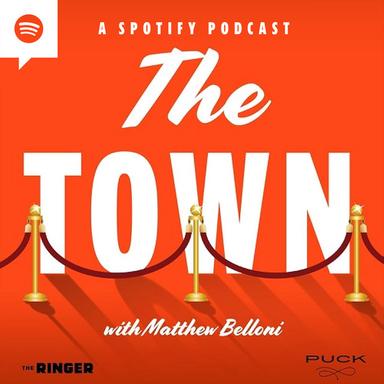
If you’re looking for evidence that William Goldman’s maxim about the movie industry—“nobody knows anything”—is as true today as it was in 1983, you could do worse than a piece published by Variety on March 28. “Mike De Luca and Pam Abdy Under Fire at Warner Bros. Amid Box Office Flops,” its headline proclaimed, invoking the coheads of Warner Bros. Motion Picture Group. What followed made the Warners film division sound as chaotic and troubled as the one from The Studio, if not One Battle After Another’s fractious French 75.
“With morale on the lot dangerously low, industrywide chatter and numerous reports suggests that De Luca and Abdy’s days running Warner Bros. could be numbered,” the trade report divulged, citing sources who “say the pair have lost the confidence of Warner Bros. Discovery CEO David Zaslav, whose impatient management style is focused on the bottom line.” Additional anonymously sourced sniping described a ‘swirling fiasco’ of tension,” punctuated by “shouting matches” and “bickering.”
De Luca and Abdy denied the allegations of acrimony and, per the piece, “stood strong behind their next crop of movies.” De Luca confidently forecasted, “We think we’re turning a corner with Minecraft and we’ll have wind in the sails for our diversified slate strategy.”
With apologies to Goldman, either De Luca and Abdy knew something, or they really lucked out. Because almost immediately after reports of the executives’ possible ouster intensified, Warner Bros. embarked on a blistering box office run that made the March rumors seem like fodder for Freezing Cold Takes. And after a string of several lucrative openings, the studio’s big-budget bet on director Paul Thomas Anderson, One Battle After Another, has built Best Picture buzz, providing a critical-acclaim capper to the studio’s late-blooming annus mirabilis. Or, more accurately, miraculous half year, because that’s how long it took for Warner Bros. to go from foundering to flourishing as the studio mustered an unprecedented streak of successes.
As De Luca had hoped, the Warner resurgence started with A Minecraft Movie, which opened days after that Variety report appeared and went on to earn almost $1 billion worldwide. Since then, the studio has hardly gone more than a month without a movie opening at no. 1 at the U.S. box office—and many of those movies have held on to their audiences in subsequent weeks.
We’re No. 1, Again: Warner Bros.’ Streak of No. 1 U.S. Box Office Openings
A Warner Bros. film has led the U.S. box office in 16 of 39 weekends this year. And the percentage might have been higher had the studio’s offerings not competed with each other at times: Sinners supplanted A Minecraft Movie, and The Conjuring bumped Weapons off the top perch. Weapons gave Warners a record sixth straight opening of $40 million or more (unadjusted for inflation), which prompted The New York Times to trumpet it as “one of the most remarkable studio turnarounds in Hollywood memory.” The Conjuring extended that streak to seven. And although One Battle After Another ended that run, it did give Warner Bros. a ninth no. 1 opening on the year (including Mickey 17’s March premiere).
Unlike Mickey 17, a film from a cinephile favorite with a Best Picture past, One Battle has thrilled moviegoers and become an early front-runner for a Best Picture future. While OBAA delivered the biggest opening of the oft-nominated, never-anointed Anderson’s career, it also cost by far the most money to make and market, with a combined budget of at least $200 million. Its path to profitability is still hazy, despite an “A” CinemaScore, a lofty PostTrak recommendation rating, and ample publicity from breathless reviewers and cultural commentators, which could lead to a long tail at the box office. Even if it doesn’t pay for itself financially, though, it could justify the investment by burnishing Warner Bros.’ reputation in Hollywood with a clutch of Academy Awards. Plus, the pressure to turn a profit is less acute now than it was in March, when the movie was pushed back from August to September and the job security of “Mike and Pam” was the talk of the town. “Seven for them, one for me” is an easier sell to a studio than the original saying.
Warners has half of the top 14 films at the domestic box office this year, and that’s with only 11 new WB movies released, down from double that total in some pre-pandemic years. The studio is responsible for over 25 percent of all domestic movie tickets sold, more than double last year’s figure. That’s not quite as high a market share as Disney garnered in 2019, when Avengers: Endgame led a long list of blockbuster sequels and remakes, but it’s otherwise unparalleled dating back to at least 1995. Granted, that number is bound to come down: With Mortal Kombat II and Maggie Gyllenhaal’s The Bride! delayed to 2026, the only new movie remaining on WB’s 2025 slate is next month’s coproduction The Family McMullen. The latest in a wave of belated sequels—in this case, to 1995’s The Brothers McMullen—will play in theaters for only one day.
Wherever that percentage settles, Warner Bros. has already won by becoming the first studio this year to top $4 billion at the global box office—a threshold it hadn’t hit since before the pandemic. Just as striking is how it got to that total: a blend of originals, revitalized franchises, and genres that aren’t known as safe bets to make bank.
Only six movies with original screenplays not based on any preexisting source material—Flight Risk, Novocaine, Sinners, F1, Weapons, and KPop Demon Hunters—have won a weekend at the U.S. box office this year. Half of them were from Warner Bros. (That doesn’t count One Battle After Another, which was loosely inspired by Thomas Pynchon’s 1990 novel, Vineland.) And of the top 16 movies at the U.S. box office, only that trio of Sinners, F1, and Weapons, along with A Minecraft Movie, weren’t remakes or installments in a preexisting film franchise.
A Minecraft Movie was an adaptation of mega-popular IP, but Sinners and Weapons—along with Final Destination: Bloodlines and The Conjuring: Last Rites—were more surprising standouts. Horror movies reliably deliver great returns on investment (thanks to their modest budgets), but not great raw box office numbers. This year, though, horror has accounted for 17 percent of domestic movie tickets sold, easily the highest annual figure on record—and Halloween is still a few weeks away. That boost is largely attributable to Warner Bros., which has swept the top four spots on the genre’s domestic box office leaderboard. And although even crowd-pleasing horror movies rarely get great reviews, Sinners and, perhaps, Weapons could join One Battle After Another in Oscar contention.
Warner Bros. even revitalized the flagging institution of the sports movie. “Adjusting for inflation, no sports film has grossed more than $300 million since The Karate Kid remake released 14 years ago,” noted a 2024 Sports Business Journal feature titled “Whatever happened to the sports movie?” F1 wound up making more than $600 million. F1 producer Jerry Bruckheimer acknowledged to the SBJ that sports movies typically “don’t travel well, so they don’t do well overseas,” but Formula One has a huge international audience, and the movie made most of its money abroad.
Perhaps most importantly for the Motion Picture Group, Superman became the highest-grossing superhero movie of the year and put the fledgling DC Universe on solid footing financially and creatively. This spring, DC Studios co-chairman and CEO Peter Safran was mentioned as a candidate to replace De Luca and Abdy; now he has his hands full shepherding the burgeoning DCU alongside James Gunn. A viable replacement for the dysfunctional former DCEU raises the long-term box office floor and ceiling for Warner Bros.
“Film industry veterans said they could not recall another example of a studio going from gloom to boom so quickly and forcefully,” read a Times story about Superman in July, which also quoted a Comscore analyst as saying, “They went from 0 to 100 in like five seconds.” That would be slow for Sonny Hayes or Joshua Pearce, but it’s fast for a film studio.
How did industry analysts fail to foresee that turnaround? Variety was far from alone in (mis)reading the tea leaves. On March 30, Bloomberg—following up on a previous bulletin that WB’s “boss is losing patience,” reported that Zaslav was “meeting with potential replacements” for his film studio heads, whose contracts were set to expire next year. And earlier in March, Kim Masters of Puck had also addressed the topic that “had built to a crescendo,” writing, “Warners was once considered the Tiffany of movie studios. … Presiding over the destruction of the place is hardly the Hollywood ending that Zaslav envisioned.”
In fairness to the pundits, Warners was in the midst of a very rough run of bad PR and box office flops or bombs, most notably last October’s Joker: Folie à Deux. This year started slow, with Mickey 17 and The Alto Knights (a pet project of Zaslav’s) fizzling on the heels of a disappointing reception for December’s The Lord of the Rings: The War of the Rohirrim. To make matters worse, WB had developed a reputation as anti-filmmaker, due to the 2021 “Project Popcorn” campaign, which moved movies to HBO Max day-and-date to drive streaming subscriptions, angering creatives (including Christopher Nolan, who decamped for Universal); Zaslav’s decision to shelve completed films like Batgirl and Coyote vs. Acme for tax-write-off reasons, which got Zaslav labeled “the most hated man in Hollywood”; and the extremely limited theatrical release for Clint Eastwood’s Juror No. 2.
“Even in an industry of hits and misses, we must acknowledge that our studios business must deliver more consistency,” Zaslav said last November, as the Motion Picture Group’s earnings dwindled and Warner Bros. Discovery’s share price sank into the single digits. Hence the scrutiny surrounding the sizable production and development pacts (and big budgets) dispensed by De Luca and Abdy, whose strong relationships with talent didn’t translate into discounted deals. When two of their top lieutenants were dismissed in January, the vultures seemed to be circling.
In retrospect, the De Luca and Abdy doomerism was premature: The duo, who joined Warner Bros. in June 2022 after exiting MGM that April, hadn’t done much of the damage to the WB brand. Most of the duds were inherited from the previous regime; per The Hollywood Reporter, A Minecraft Movie was “their first true greenlight from start to finish” (although Puck called it “a long-gestating co-production” that “took its final form” before their arrival). It’s easy to say this in hindsight, but the films that they commissioned or shepherded into theaters this year were a smart mix of IP plays and ambitious, auteur-driven movies with mass appeal—a diversified, popular portfolio that couldn’t miss, even if nobody knew it beforehand.
It took only a few weeks for Minecraft and Sinners to restore the studio’s standing and for the backlash to the Warner Bros. backlash to begin. By early September, Variety had conceded that De Luca and Abdy were “fully off the hot seat.” For now, we do, in fact, have to hand it to the once derided Zaslav, or at least to the people he put in charge: They’ve had, in Zaslav’s words, “a hell of a run.”
How long will it last? On an August podcast, I ”sold” my imaginary stock in Warner Bros. Motion Picture Group, not because of any particular lack of faith in its leadership, but because, I figured, the price must have peaked. As analyst David A. Gross of Franchise Entertainment Research told Variety in September, “Studios get hot, and studios get cold. Just before this, they weathered a long, bad run. It won’t last forever. Hopefully they’ll remember this when they go on a cold steak. That’ll happen too; it always does.”
There’s more riding on WB’s continued success than the job security of its studio heads. In June, Warner Bros. Discovery announced a forthcoming split into two companies, one of which will consist of its streaming and studio business. And in September, reports surfaced that the recently merged Paramount Skydance, on an acquisition spree, would make a majority-cash bid to buy the bifurcated company. WBD’s stock—the real one, that is—rose sharply on the news. If Paramount Skydance does complete that transaction, it will be buying high on Warners—well, the movie divisions, at least—in the wake of what The Town host Matthew Belloni called “one of the greatest heaters in modern Hollywood history.”
But what will it be buying? As Puck’s Scott Mendelson wrote in August, “the biggest issue facing the movie portion of the studio is that its success this year will just create challenging comparisons when 2026 rolls around.” Warner Bros. has a crowded 2026 slate to follow a five-month lull, including writer-director Emerald Fennell’s Wuthering Heights; two DC movies (Supergirl and Clayface); two animated movies featuring well-known characters (The Cat in the Hat and, at long last, Coyote vs. Acme); the two movies originally scheduled for this year (The Bride! and Mortal Kombat II); another attempt at making The Mummy happen; another sequel to an aged original (Practical Magic 2); the next films from David Robert Mitchell (Flowervale Street) and Alejandro G. Iñárritu (still untitled, but starring Tom Cruise); and, in mid-December, provided it doesn’t slip, Dune: Part Three.
There’s plenty of potential there. Dune aside, though, there’s nothing that seems as safe a bet as Minecraft or Superman. In March, Masters wrote that the 2025 Warners lineup looked “risky and expensive—or bold and original.” Maybe it was both, but boldness and originality carried the day. Next year, the risk and expense could—or, alternatively, the results might regress to the mean and settle in somewhere between annus mirabilis and annus horribilis. Nobody knows anything.
Actually, one thing seems safe to assume. “Their days are numbered,” an unspecified agent ominously told The Wrap this spring, speaking of De Luca and Abdy. That’s technically still true. (Isn’t it always?) But six months later, that number—much like the box office numbers for Warner Bros.—has undoubtedly gone up.



